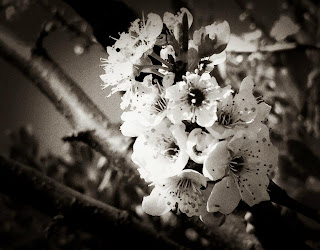For
many years, always in March,
I’ve felt sorry for these quiet
days and cloudy skies. The arrival
of the real spring has something
frightening in it. Everything
is suddenly new and strange - the doormat, unwashed windows,
willow buds, tufts of grass sticking up through the snow,
the starlings and the moon above the floodplain.
Everything is like a call, everything's tempting and luring you
out of the room, out of home, out of yourself, out of mind,
to flow over land and water, to go somewhere else,
to be somewhere else, somebody else,
and if you cannot then at least
to shout, to dance, to write,
to sing some stupid spring songs
in order to soothe this urge.
I can’t understand whether it’s in the blood or in the mind
or somewhere else. Maybe it’s the cellular memory
of my ancestors - fish, birds or peasants -
the memory of previous lives awakening in me
an urge to swim to flooded meadows to spawn
to look for a partner and a nesting place
to feel with a hand whether the soil is warm enough;
or something even more mysterious and archaic:
the understanding of a seed that it's time to sprout,
the thrill and fear of yet another death and birth.
I’ve felt sorry for these quiet
days and cloudy skies. The arrival
of the real spring has something
frightening in it. Everything
is suddenly new and strange - the doormat, unwashed windows,
willow buds, tufts of grass sticking up through the snow,
the starlings and the moon above the floodplain.
Everything is like a call, everything's tempting and luring you
out of the room, out of home, out of yourself, out of mind,
to flow over land and water, to go somewhere else,
to be somewhere else, somebody else,
and if you cannot then at least
to shout, to dance, to write,
to sing some stupid spring songs
in order to soothe this urge.
I can’t understand whether it’s in the blood or in the mind
or somewhere else. Maybe it’s the cellular memory
of my ancestors - fish, birds or peasants -
the memory of previous lives awakening in me
an urge to swim to flooded meadows to spawn
to look for a partner and a nesting place
to feel with a hand whether the soil is warm enough;
or something even more mysterious and archaic:
the understanding of a seed that it's time to sprout,
the thrill and fear of yet another death and birth.
Jaan Kaplinski, Selected Poems, Bloodaxe Books, 2011.
Durante muitos anos, sempre em Março,
senti pena destes dias tranquilos
e céus nublados. A chegada
da verdadeira Primavera tem algo
de assustador. Tudo
de súbito é novo e estranho - a esteira,
as janelas sujas,
os botões do salgueiro, os tufos de erva
a espreitar por entre a neve,
os estorninhos e a lua sobre a planície
alagada.
Tudo é uma invocação, tudo é tentador e
te atrai
para fora do quarto, fora de casa, fora
de ti, fora do pensamento,
para fluir sobre a terra e a água, para
ir para outro lugar,
para estar noutro lugar, ser outra
pessoa,
e se não o conseguires pelo menos
gritar, dançar, escrever,
cantar algumas canções estúpidas de
Primavera
a fim de acalmar esta ânsia.
Não consigo perceber se isto está no
sangue se na mente
se noutro lugar. Talvez seja a memória
celular
dos meus antepassados - peixes, pássaros
ou camponeses -
a memória de vidas passadas a despertar
em mim
uma ânsia de nadar até prados alagados
para desovar
para encontrar um parceiro e um lugar
para nidificar
para sentir com uma mão se a terra está
suficientemente quente;
ou algo ainda mais misterioso e arcaico:
a percepção da semente na hora de germinar,
a emoção e o medo de outra morte e outro
nascimento.
Tradução: Sandra Costa [2012].



